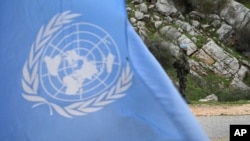A group of activists is calling for the United Nations to remove immunity granted to civilian and police personnel in peacekeeping missions, saying doing so will deter sexual abuse and exploitation of the people they are sent to help.
Paula Donovan of Aids-free world, the group that launched the campaign Wednesday in New York, said that currently U.N. civilian and police personnel on peacekeeping missions are protected by immunity until the U.N. secretary-general waives it.
“[Let] everybody in the world know that when the secretary-general and the United Nations say zero tolerance for sexual exploitation and abuse, it doesn’t mean we will put that on hold until the secretary-general decides whether we will have just a little bit of tolerance or a little bit more,” said Donovan.
The group, which includes former South African first lady Graca Machel and Canadian Lt. General Romeo Dallaire, who raised the alarm on the 1994 Rwandan genocide, is launching its “Code Blue” campaign in the wake of a child sex abuse scandal.
Several French, Chadian and Equatorial Guinean soldiers deployed in the Central African Republic are alleged to have traded food for sexual acts with young boys there. The abuse came to light after a U.N. aid worker leaked an internal report detailing the allegations.
The abuses took place in 2014, and the accused troops were not U.N. peacekeepers at the time, but the organization has been criticized for not stopping the abuse as soon as it learned of it, and for temporarily suspending the official who leaked the report. France has opened a criminal investigation into the matter.
U.N. Assistant Secretary-General for Field Support Anthony Banbury said civilian staff are covered by “functional immunity,” which limits protection to events that happen during the conduct of their duties and does not cover crimes such as rape, while military personnel under the U.N. banner are under the jurisdiction of their home countries, not the United Nations.
“We as an organization have an interest in having criminal accountability against individuals working for the U.N. who are alleged to have committed these crimes,” he said. “We want justice done. We want them not wearing a blue beret or holding a blue contract; we want them behind bars. We want them in jail.”
In 2014, fifty-one allegations of sexual exploitation and abuse were reported in nine U.N. peacekeeping missions. Fourteen cases involved staff, 13 cases related to police and 24 cases involved military contingents or observers.




